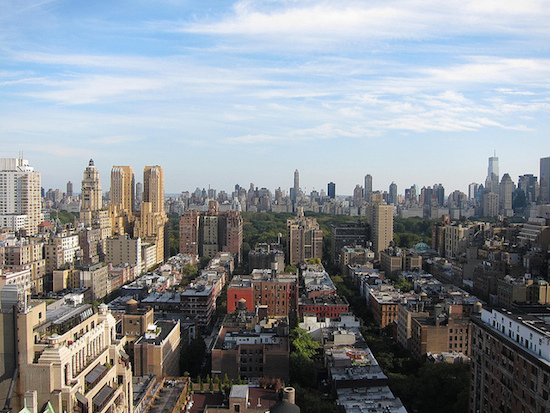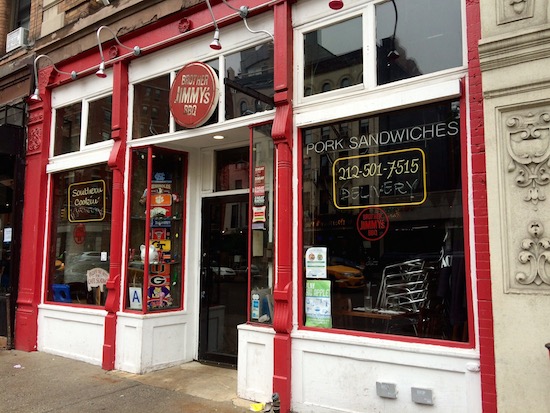Certain rent regulations may expire Monday night at midnight, because the state is dysfunctional, but that doesn’t mean tenants will suddenly lose their right to their rent-stabilized apartments. The city has set up a hotline to call if you’re worried or wondering about your status, or if your landlord contacts you. Learn more here.
“If you have a lease, this should not affect you during the term of your lease; but it could affect you after your lease expires or when you try to renew it.
Mayor de Blasio has launched an emergency hotline so that, right now, anyone living in a rent-regulated apartment in New York City can call 311 and be connected to legal assistance from experts at Legal Services NYC, Legal Aid Society between 9 AM and 8 PM, Monday-Friday.
If you live in a rent regulated unit and have questions, please contact 311 and you will be connected to a hotline staffed by attorneys and legal interns who can provide the support and information tenants need to protect their rights.”
This has happened before, and legislators eventually voted to extend the laws and cover the gap when they lapsed.
“Rent regulation laws were last allowed to expire in 2011, though only for a few days. That year, legislators passed a retroactive extension to cover the gap period.”
Here’s more info from Legal Aid.
Photo by Bosc D’Anjou.









Amazing that we continue with a dysfunctional state.
That could be a problem some time…
Sadly, the only reason the State was somewhat functional is because everyone in charge was corrupt.
I’d take dysfunction over corruption. Frankly, kicking EVERYONE out and starting over would be better than the current mess.
I hope that the rent regulations are phased out. The gravy train has to end at some point.
Dear 9d8b7988045e4953a882,
Since you are trying to disrupt the lives of 1,000,000 of your fellow NYers, I’d like your real name (Or, is it really 9d8b7988045e4953a882?).
I wish we could get a comprehensive holistic approach to changing rent regulations. The current setup dramatically increases the rents of those not in regulated apartments. Landlords have to make up for those that are priced at rents that would unsustainable if the landlord wasn’t able to subsidize it by overpricing other apartments in the building.
@John Gibson-As a landlord of a 10 unit building I can assure you that what I charge free market tenants is NOT based on the regulated rents that other tenants pay. I charge what the market will allow me to charge. If my rent regulated tenants all moved out tomorrow the market priced tenants’ rent would not decrease. I continue to hear this “logic” and it is simply not true.
I treat my regulated tenants no different than free market tenants. As my costs of operation increase every year, I raise rents whenever & however legally allowed. Given that my property taxes are tens of thousands of dollars per year, that I regularly do preventive maintenance, and that I maintain a capital fund in the event of an emergency, the profit margin may not be as great as people like to believe.
I have 3 regulated tenants. I think regulation is good. It is the cost of living in a civilized society. But the argument that there is some sort of market value rent vs. regulated rent welfare system going on is simply not true.
You sound like a great landlord. Kudos to you.
an honest and truthful landlord… hurrah Catherine.
why are people so favorable to landlords? why are some so concerned with landlords’ profits and not with the middle class, poor, working class and seniors who live in rent stabilized apartments?
we’ve seen what happens when tenants don’t have protection. look at the Williams.
the same myths get repeated over and over again:
“the gravy train has come to an end”: really? you think that the people living in rent stabilized apts are rich people living “high on the hog”? that flies in the face of reality.
“The current setup dramatically increases the rents of those not in regulated apartments. Landlords have to make up for those that are priced at rents that would unsustainable if the landlord wasn’t able to subsidize it by overpricing other apartments in the building.”
false, and verifiably so. the landlords’ margins on operating costs in rent stabilized building in Manhattan are quite high. In Manhattan in 2013 they were close to $800 per rent stabilized unit (net operating income). landlords also receive a large amount of income from other services, such as selling parking, laundry, etc. these secondary sources are very high.
all the statistics are on the Rent Guidelines Board web site. look at the “Income and Expense Study 2015”. i link to the page below.
so landlords are not charging high rents to market rate units to “compensate” for the so-called subsidies given to rent stabilized tenants. landlords are already making PLENTY of money on rent stabilized tenants. they are charging these ultra-high rates to achieve the highest profit margin they legally can… in effect, super-profits.
https://www.nycrgb.org/html/research/cresearch.html
@Bruce, I agree that the favoritism for landlords and not for our fellow neighbor is disturbing. However, you mention other ways of making income as a landlord-not all of us have those options. On the other hand, rent regulations do not prevent us from making more money in other ways. There are many ways to get more money. If a tenant wants a new fridge I can increase their rent X amount a month and not until I recoup the cost of the fridge but for as long as they live in my building. So the next time I renew their lease the percentage is based on a now increased amount thanks to the fridge. I can charge when I install smoke & CO2 detectors. And every year the lease is renewed I have the option to raise the rent. When landlords say “I can’t do anything. They are regulated.” That’s not totally correct.
Let’s talk about the tenants that are cheating the system. I know someone who has a tenant, regulated, who does not live in the apartment full time. He comes and goes but has a house in suburbia he lives in. He has another living option. The landlord has been unable to prove that the apartment is NOT his primary residence. That apt is “gravy train” for him. No one is tar & feathering him.
Like anything else there is a small percentage of people on either side who are trying to scam the system. It happens.
agreed… i don’t believe tenants should have rent stabilized apts if it is not their primary residence. Period. Your other points, re: MCIs and apt improvements, are accurate, Catherine.
i live in a large building with a big mgmt company. i am an owner who used to be a tenant. In general, the landlord for the remaining tenants has the resources to go after them when they are not playing it straight. however, they also go after a lot of innocent people. including seniors.
small landlords don’t have as many resources to investigate. however, many small landlords are not as even-handed as you, and some can be pretty mean. I agree that some are fair and reasonable and some tenants are skunks.
the huge valuations on these buildings and apts are throwing everything out of wack. I have benefited from it by buying at the right time. but i don’t believe the neighborhood or the city has benefited.
I find the comments posted thus far in this thread by Catherine and Bruce Bernstein to be quite reasonable. (Even though I tend to take rather vehement exception at many of BB’s comments on other topics.)
I wish to re-post a detailed reply that I had made to a blanket attack on rent-regulated tenants by “9d8b7988045e4953a882” back in April. The post that I am replying-to can be accessed at:
https://www.westsiderag.com/2015/04/05/uws-building-that-bans-some-renters-from-gym-may-be-discriminatory-ctiy-sayscity-sets-hearing#comment-264963
A number of the other posts in that thread are also quite apropos here and worth reading.
———
All the benefits of owning? Really?
You mean like being able to sell one’s apartment?
Rent it out to others?
Spend as little time there as one wishes?*
These are all benefits of being a property owner that a rent-regulated tenant absolutely does not have.
(*Rent-regulated units are subject to a primary residency requirement.)
First of all, isn’t that only if and when the building goes co-op?
Secondly, just how “large” are these buyouts? Could you, perhaps, give us some idea?
Are the amounts sufficient so as to enable those receiving them to be able to afford to move into a market-rate rental if they had previously been unable to do so?
Succession is far less easy and simple than you and other opponents of rent regulation I have seen here make it seem.
Here is an excerpt from the fact sheet on succession rights from the New York State Homes and Community Renewal web site:
Even when the requirements have been clearly and unquestionably met, a family member may still face a battle in establishing their succession rights. Consider the following excerpt from the Metropolitan Council on Housing’s web site:
( https://metcouncilonhousing.org/help_and_answers/succession_rights )
I’m not sure just how you figure that. Firstly, wouldn’t whatever additional funds or assets an individual or family has as a result of having to pay less in rent be subject to the same taxes as any of the other funds or assets of said individual or family?
Secondly, by the logic you seem to be using, couldn’t you say the same thing about anyone who, for example, rents in the outer boroughs where rents are almost invariably considerably lower than those in Manhattan? Or even about those who choose lower-priced cars, homes, clothing, electronics or just about anything else over higher-priced options? Would you suggest that every time someone buys a Ford instead of a Mercedes, for example, that they be taxed for the difference in price between the two?
Implicit in that statement is an acknowledgment that a necessity to move frequently is endemic to the reality of an unregulated rental market. If that is indeed true then many, myself included, would contend that such a reality is itself a strong argument in favor of rent regulation.
Moving is disruptive, especially for families. Do you believe that society has a legitimate interest in promoting stability for families and even individuals? Aren’t conditions of stability conducive to order, peace, tranquility and productivity, while conditions of instability are the opposite, fostering chaos, disorder, stagnation, dissolution and even violence?
Also, your statement as it was presented, without any qualifiers or elaboration, could be construed as implying that even when a rent-regulated tenant moves, they are somehow exempt from the normal costs of moving and broker fees that others must bear. That is certainly not true.
The article states clearly that, “Dorsey has said she’d be fine with paying a fee to use the gym,” [emphasis mine- Independent]
As I stated in my previous detailed post on this matter (comment #12), I do not see a basis for legally compelling a landlord in a case such as this. But if a facility such as the one under discussion (in this case, a gym) can comfortably accommodate all of the tenants in a given building and the rent-regulated tenants are prepared to pay a fee for the use of such a facility, then why shouldn’t they be permitted (and even welcomed) to do so? Can you articulate a reason?
Independent, thank you for the comments.
Re: buyouts. I can only speak about my building, 230 riverside. it went condo circa 2006-2007.
I was a tenant at that time and bought. I was on the Tenant Assoc Exec Committee and negotiating committee, we negotiated with the sponsor, the notorious Brack Capital, now taking over the Williams from the Salvation Army (sigh) and throwing out the seniors.
we took the position that we would try to get “something for everyone”:
1) insider discount and other things for tenants who wanted to buy
2) buyout for tenants who wanted to leave
3) certain protections, especially against MCIs (Major Capital Improvement rent raises) for tenants who wanted to stay.
we were able to get significant concessions on #1 and #3. for example, we got a 10 year ban on MCI rent increases.
it was very hard / impossible to get significant buyouts on pt #2. My recollection is that the best we could do was $25K per room: 25K for studios, 50K for 1 bedroom, and i think it was 75K for 2 br.
it might have been 50K a room but i don’t think it was.
the bottom line is that if the tenants could finance it, it was better to take the insider discount and then flip the apt. the buy outs were pretty limited compared to what the apts were listing for (400K or more for studios, 700K or more for 1 BR, etc). these were “outsider” prices.
@Independant-I think we can all agree that people who bang the drum the loudest on either side seem to know the least. It’s very easy to push along the urban legends of apartment regulations and not do research.
I have to comment that the questions you have been asked are epically comical! I’m still shaking my head at the “all the benefits of owning without having to save up for a down payment.” comment. Either they aren’t even thinking or they don’t aren’t listening to themselves. I’m still bouncing that comment around thinking “HUH? Whaaaaa? Howwww? Oh never mind.”
If rent regulation is the same as ownership that means those tenants are responsible for the yearly property taxes too! Can’t wait to tell my regulated tenants! OH wait, I can’t do that….because it’s not true….like so much of this stuff. *sigh*